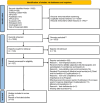E-CARE as core competencies for palliative social workers: a systematic review
- PMID: 40490802
- PMCID: PMC12147374
- DOI: 10.1186/s12904-025-01735-0
E-CARE as core competencies for palliative social workers: a systematic review
Abstract
Purpose: To identify the core competencies of social workers in palliative care.
Method: A systematic review of 19 high-quality studies published in English and Chinese up to February 2025 was conducted.
Results: The study identified five core competencies-Ethics, Coordination, Assessment, Resource Allocation, and Education-establishing the core competencies of social workers. They serve as interdisciplinary coordinators, communication facilitators, and educators, addressing psychosocial, emotional, and environmental challenges while navigating systemic resource constraints. The framework emphasizes ongoing assessment, resource allocation, and educational interventions, positioning social workers as system navigators and existential educators essential to compassionate, patient- and family-centered care.
Discussion: E-CARE framework equips social workers to navigate complex care ecosystems, foster team cohesion, mediate conflicts, advocate for patient autonomy, destigmatize end-of-life discussions, and promote resilience through ongoing training, particularly in resource-constrained settings.
Keywords: Core competencies; End-of-life care; Hospice; Palliative care; Social work.
© 2025. The Author(s).
Conflict of interest statement
Declarations. Ethics approval and consent to participate: None. Consent for publication: Not applicable. Competing interests: The authors declare no competing interests.
Figures

References
-
- World Health Organization. Palliative care. Geneva, Switzerland; 2020. Available from: https://www.who.int/news-room/fact-sheets/detail/palliative-care [Last accessed: 02/26/2025].
-
- Tan MP. Healthcare for older people in lower and middle income countries. Age Ageing 2022;51(4):afac016; 10.1093/ageing/afac016 - PubMed
-
- Taels B, Hermans K, Van Audenhove C, et al. How can social workers be meaningfully involved in palliative care? A scoping review on the prerequisites and how they can be realised in practice [published correction appears in Palliat Care Soc Pract 2021 Dec 16;15:26323524211067890; 10.1177/26323524211067890.]. Palliat Care Soc Pract 2021;15:26323524211058895. Published 2021 Nov 30; 10.1177/26323524211058895 - PMC - PubMed
Publication types
MeSH terms
Grants and funding
LinkOut - more resources
Full Text Sources
Medical

